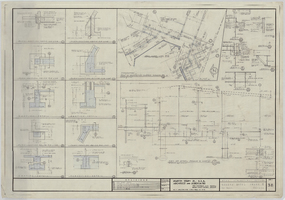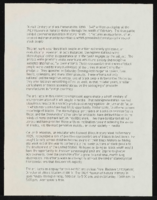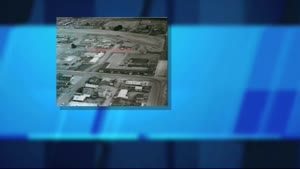Search the Special Collections and Archives Portal
Search Results

Al McDaniels interview, February 28, 1980: transcript
Date
Archival Collection
Description
On February 28, 1980, Rodney Goosby interviewed Al McDaniels (b. 1940 in Muskogee, Oklahoma) about his life in Las Vegas and his career as an athletic coach. McDaniels, referred to as Coach by Goosby, speaks primarily about his time as a coach for track and field at the University of Nevada, Las Vegas, his community involvement and the city’s recreational activities. Moreover, McDaniels speaks about his education and his current research as he works on a doctoral degree in physical education. Lastly, he talks about the city’s growth and the move from empty desert spaces to housing and shopping center constructions.
Text

Sahara Hotel Phase IV architectural drawings
Date
Archival Collection
Description
Drawings from Martin Stern Architectural Records (MS-00382) -- Sahara Hotel and Casino: Las Vegas, Nevada -- Project drawings -- Phase 4: retail shops.
Image

"Half Century of Black Memorabilia" exhibit text by Roosevelt Fitzgerald
Date
Archival Collection
Description
From the Roosevelt Fitzgerald Professional Papers (MS-01082) -- Personal and professional papers file.
Text

Hildred Meidell interview, February 27, 1979: transcript
Date
Archival Collection
Description
On February 27, 1979, collector Greg Abbott interviewed Hildred Meidell (b. March 17, 1900 in Webb City, Missouri) about her time living in Las Vegas, Nevada. Meidell covers a range of topics, from her and her husband’s time as tourists in the city and their subsequent retirement to Las Vegas from Los Angeles, California. Meidell describes the Las Vegas Strip, the interstate and highway conditions between Los Angeles and Las Vegas, as well as their numerous visits to Hoover Dam (Boulder Dam). Moreover, she speaks about the changing layout of the city, the increase in shopping centers and department stores, and the clothing stores inside of hotels. Lastly, Meidell talks about the prominence of churches in local communities, the atomic testing program and the structural damages these tests caused in her neighborhood, and the influence of the railroad and passenger train on the town.
Text

Las Vegas African American Community Conversations, Part 3: Civil Rights and Entertainment: video
Date
Archival Collection
Description
The Las Vegas African American Community Conversations is a four part, one hour round table conversation with local Las Vegans. They share their powerful stories and great history, with topics ranging from “Migration, Civil Rights, Education, Church, Entertainment and the Early Legal Community”. Part Three: A conversation about ” Civil Rights and Entertainment” MODERATOR- Claytee D. White (Director-Oral History Research Center) PANELISTS- Lonnie G Wright (College Professor/Business Owner) LaVerne C. Ligon (Director- Simba Talent Development Center Inc.) Walter Mason (Director-IRA Aldridge Theater) Leonard Pock Jr. (Retired Stagehand) B.J. Thomas (Retired Stagehand)
Moving Image
David and Iris Torjman photographs, 1950s-1993
Level of Description
Archival Collection
Collection Name: Southern Nevada Jewish Heritage Project Community Collection
Box/Folder: N/A
Archival Component

Transcript of interview with Charles T. "Blackie" Hunt by Cork Proctor, July 3, 2003
Date
Archival Collection
Description
Charles T. "Blackie" Hunt, born in Pottstown, Pennsylvania in 1930, started accordion lessons at age five. He recounts learning from experienced musicians, then teaching others at age twelve because his teacher was drafted. He attended West Chester State Teachers College where, among other accomplishments, he put together a group with Nick Carlino as tenor sax player. Blackie shares detailed memories of the many musicians with whom he worked and toured. They played in venues that included Harrisburg, Toronto, and Montreal, and eventually were offered a booking at the Sahara Hotel in Las Vegas. The group that Blackie worked with in Las Vegas, Tahoe, and Reno came up with the name "The Characters" (backward 'e'), and the show featured comedy and music. It was during this time that he met Lorraine (stage name Lauri Perry), who had her own group. They were married after a couple of years and Lauri joined The Characters. Blackie and Lorraine Hunt opened Blackie's Bar on Tropicana and Eastern Avenues in the seventies. He talks about the jazz sessions that took place and the musicians who sat in on them, and how he and Lorraine eventually decided to bow out of show business themselves. The Hunts went on to open the Bootlegger, a restaurant/piano bar on Las Vegas Boulevard. They started a little comedy/music session called "Off the Cuff', in which local or touring musicians, comedians, and singers often participate. Blackie and Lorraine have been part of the vibrant history of Las Vegas and the state of Nevada for many years, and continue to make their home here.
Text
Scotch 80 roundtable discussion
Identifier
Abstract
Roundtable discussion with nine residents of the Scotch 80 community conducted by Claytee D. White on July 9, 2014 for the West Charleston Neighborhoods Oral History Project of Ward 1. The residents discuss how they came to purchase their homes in the neighborhood, the professions represented in the community, and how they protect it from commercialization.
Archival Collection

